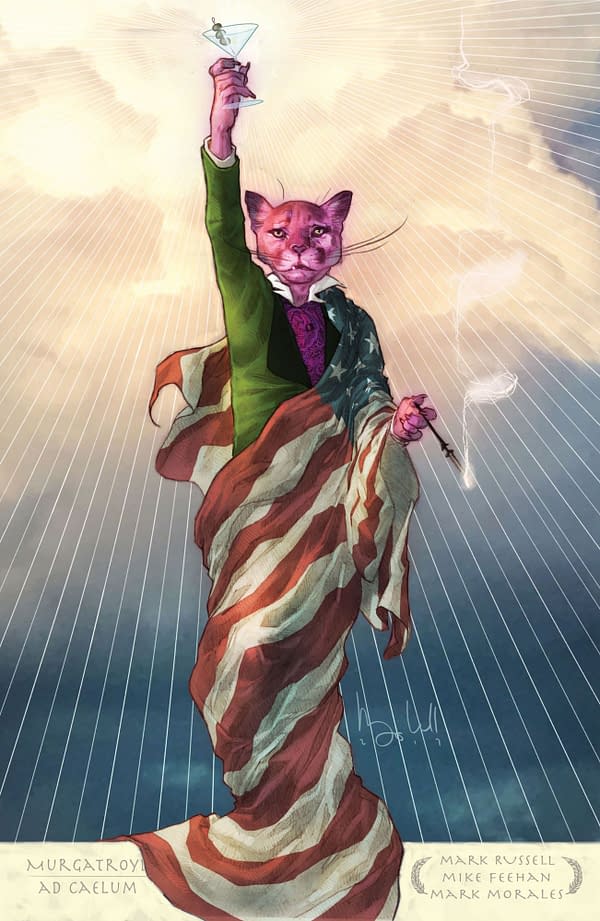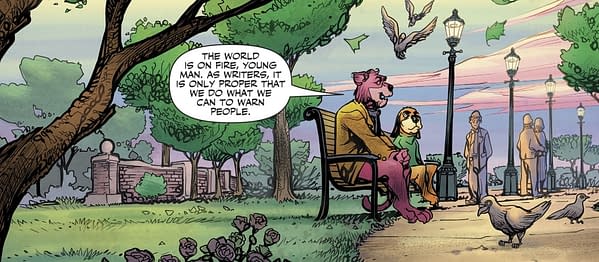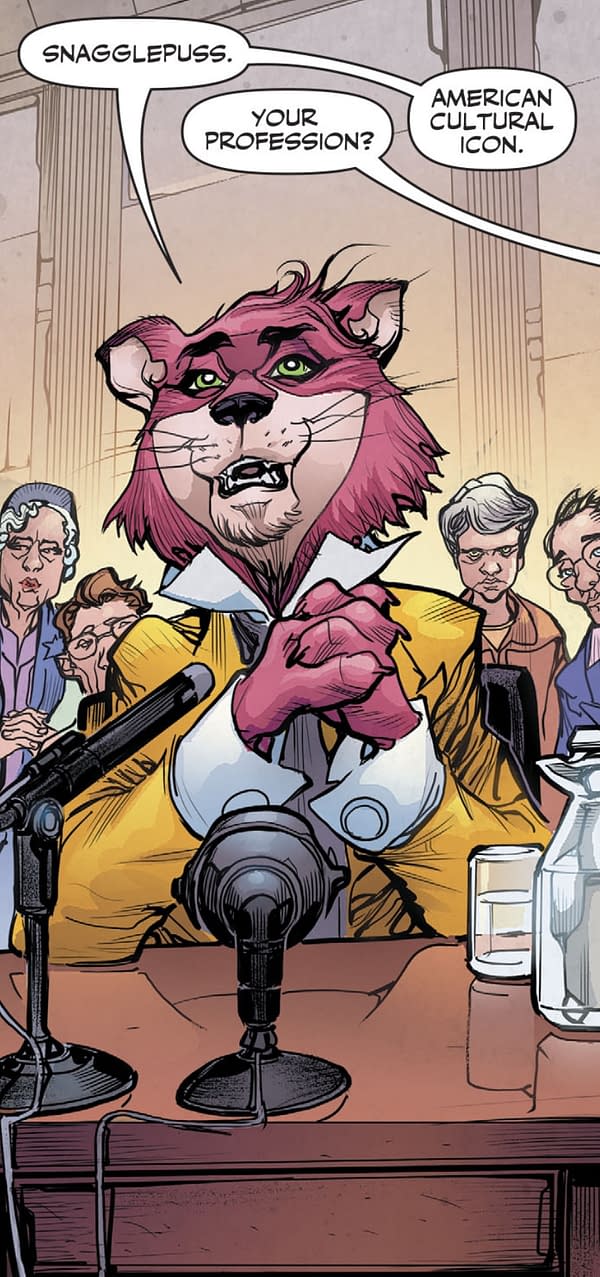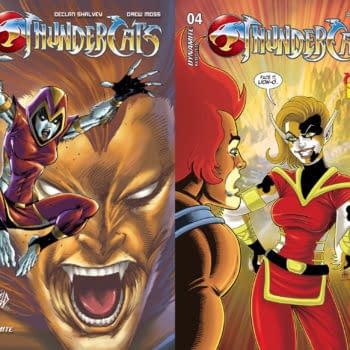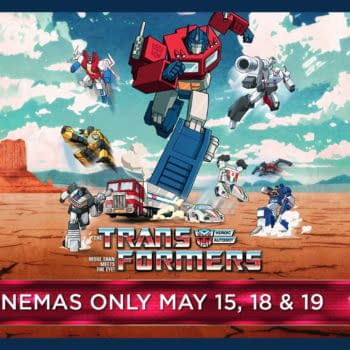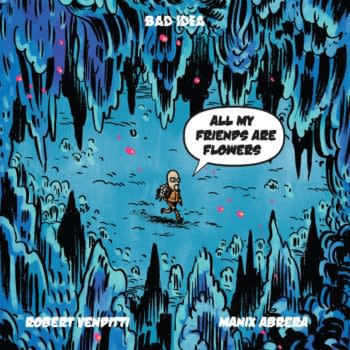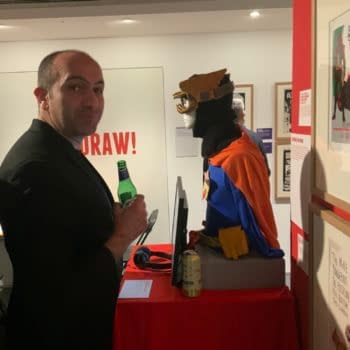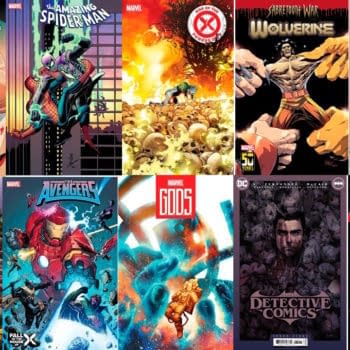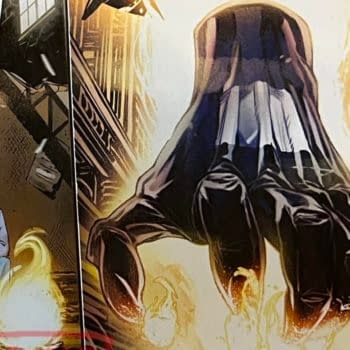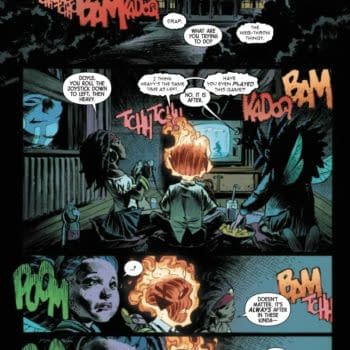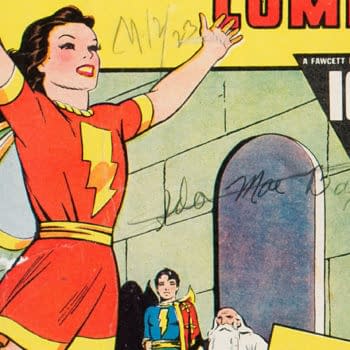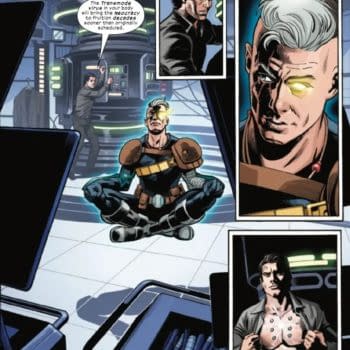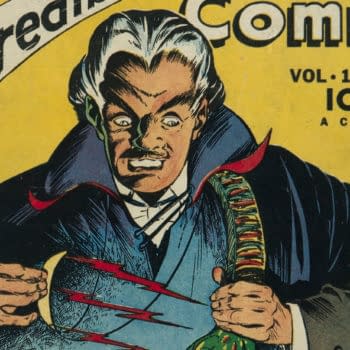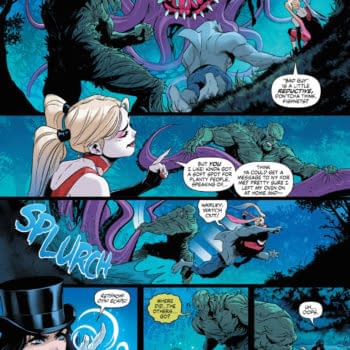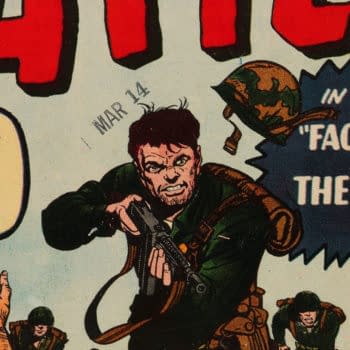Posted in: Comics | Tagged:
Jesus Should Have Been a Superhero – Talking to Mark Russell
By Mike Sangregorio writes:
Mark Russell is the writer of such titles as the late lamented Prez revival (with artist Ben Caldwell) and, from DC's Hanna-Barbera line, the Flintstones (with artist Steve Pugh). This year he was nominated for Eisner awards in three categories, including Best Writer. Though he unfortunately did not win, he still took a few minutes to speak with Bleeding Cool about his process and work.
The collected edition of his latest work, Exit Stage Left: The Snagglepuss Chronicles (with artist Mike Feehan), was made available in comic shops on August 22nd and will land in bookstores on August 28th.
Bleeding Cool: You have two new comics coming out soon, the Lone Ranger (with art by Bob Q.), previously announced from Dynamite, and the Vertigo series Second Coming (with art by Richard Pace). What can readers expect from Second Coming?
Mark Russell: An all-powerful superhero, named Sun-Man, has to share a two bedroom apartment with Jesus Christ. The conceit is that God was so upset with Jesus's performance the first time he came to Earth, since he was arrested so soon and crucified shortly after, that he has kept him locked-up since then.
God then sees this superhero on Earth a few thousand years later and says "that's what I wanted for you!" He sends Jesus down to learn from this superhero and they end up learning from each other. They learn the limitations of each other's approach to the world and its problems.
BC: Is this inspired by the occasional portrayal of Superman as a Christ-like figure?
MR: Not so much the character. I wanted to comment more on the limitations of superpowers. For most of our problems in the world, and in our lives, being able to throw someone through a plate glass window or fly aren't going to be terribly helpful. Unless your problems are travel related.
Sun-Man has to deal with things like his grandmother succumbing to dementia or that he can't adopt, because he's technically not a human being, and his wife wants a baby. These are the sorts of problems that superpowers are utterly helpless against. Jesus brings this very different view on how power can be used.
BC: Sun-Man has all the powers you might want but they're not going to help you with anything important.
MR: Right, they're useful against 0.1% of the world's problems. The other 99.9% are going to require empathy, understanding, and generosity. These are not powers in his toolkit. As we see in foreign policy, wars and immigration policy, the ability to commit physical force on a large scale creates more problems than it solves.
We need to rethink the ways to get the human race to play nice with itself because the ways we've come up with thus far, bribery and revenge, haven't solved anything. We've been nailing criminals to crosses, in one way or another, for two thousand years and we still get more criminals. It solves nothing.
BC: The name Jesus means different things to different people. What is your approach to him?
MR: I wrote two books about the Bible, God is Disappointed in You and Apocraphya Now. I learned how much we really misunderstood the teachings of the Bible and of Christ. The Christian religion doesn't really base itself on what he taught, particularly in the modern Evangelical megachurches.
They have him more as mascot on t-shirts to prove they're on the winning team. [Second Coming] is about Jesus coming down and being appalled by what he sees has been done in his name by Christianity in the last two thousand years.
He goes by a megachurch and they have a billboard of this Tom Brady-looking Jesus Christ throwing a football and he doesn't even recognize himself which is a metaphor for him not recognizing what's been done with the religion that bears his name.
BC: This is not a version of Jesus who has been aware of everything that's happened in the interim?
MR: Yeah, exactly. God was so upset with the fact that he got crucified the last time that he wouldn't even let him look through the celestial keyhole at Earth to keep up.
He still gets to talk to people when they come to Heaven so he has a rough idea of what's going on down there. He doesn't know how sideways things have gone until he's come down to Earth and sees it for himself.
BC: Is this a limited series or an ongoing one?
MR: We're slated for six issues but the goal would be to turn it into an ongoing if the reaction is positive.
BC: What do you have planned for the Lone Ranger?
MR: Lone Ranger is about the civilization of the Texas Panhandle and the advent of barbed wire, how it is used to cut the Panhandle off from Native Americans and open-range cowboys. These are people who had previously freely traversed the plains as they saw fit and now have to deal with having the land sequestered into these ranches.
It's about this grand metaphor to what's happened in American history. The ranch, and the cotton plantation, are the sorry template around which we've built our civilization. The idea is that the cotton plantation is a place where you have all the brown people working in the fields and the kitchens, the poor white men with guns, the women in the drawing room, making doilies or whatever, and there's just a few rich white guys on the patio ruling it all, sipping their mint juleps.
This has become the de facto vision for America that many Conservative voters have. I believe it all began with the idea of the ranch, to them that's "the good old days." The Lone Ranger and Tonto have to disrupt the idea to plantationize the Panhandle.
BC: What role does the Lone Ranger, as a man in a mask, play in this type of story?
MR: The need for the Lone Ranger is because there is justice and law and they are not always on the same side. He's a dead Ranger. As far as everyone he knew believes he has been killed. He is free to act on the side of justice.
The ranchers, who are carving up the land with barbed wire, have law on their side so someone needs to stand-up against them in favor of justice. He and Tonto are trying to do what they can to destroy the ranchers plans to takeover the Panhandle using guerilla warfare tactics.
I'm a big fan of Spaghetti Westerns. I think of films such as Sabata where a guy has a shotgun under the banjo or a team of outlaws has an acrobat. These crazy little quirks you see in revisionist westerns. I wanted to rewrite the Lone Ranger as this wacky, revisionist western from the 70s that has a clear vision of the America it was trying to save.
BC: The character is not going through a crisis of faith.
MR: Exactly. He immediately knows what needs to be done. This is about fighting the enormity of the power of financial interest combined with law and it's almost impossible to do because they're just two men. As a 'dead lawman' he is free from his vows to uphold the law, he's finally free to uphold justice.
BC: How do you view Tonto in this context?
MR: Tonto is the master of guerrilla warfare. He saw all this when the Comanche land was taken and he was forced onto a Reservation. He knows that when you have to fight it's better to have home field advantage and he also knows that the biggest weakness of greed is that there is always something it values more than itself.
People who are greedy place more value on what they own than on themselves so he tries to get the ranchers to fight each other. Tonto is a little wiser to the game, he understand the demands of this type of warfare more than the Lone Ranger who was this officer of the law who thought he could go in there and settle things in a straightforward gunfight.
He doesn't understand and Tonto is showing him that this is how you fight dirty. I created a scene where Tonto is at the Carlisle Indian School in the 19th century learning trick football plays. Plays taught at this school were a metaphor for guerrilla warfare because these small kids would beat the major powers, like Princeton and Yale, because of these squirrely little trick-plays that they had no defense against.
This is the mindset that Tonto adopts in fighting the ranchers who are aligned with the Texas State Government who are driving them off their land.
BC: I think Snagglepuss was the best book of the year. How did it come about?
MR: The germ of the idea was the cartoon itself. There's only two things I know about Snagglepuss and that is that he is a gay icon and the other is that he has a background in theater because both of his catchphrases, "exit stage left" and "Heavens to Murgatroyd," are theater references.
Why did he have to leave theater to get into cartoons and what would it have been like to be a gay man living in 1950s New York in the theater scene? Someone who is supposed to be creating honest, authentic art but who himself cannot be honest or authentic about his life. What's that like, to have to create from behind a mask?
This evolved from taking the original premise as seriously as possible and using Tennessee Williams as my model. He was my guiding light for writing Snagglepuss. Huckleberry Hound is a William Faulkner type of figure, this Gothic novelist who has to live on the run. He's not rich and he has to live as, as he calls himself, "an unclean ghost haunting the land."
BC: Huck was my favorite character. I could not believe how tragic this Hanna-Barbera character had become.
MR: This is what happens when people are forced to live in the closet of loneliness, they have no way of finding a community, and they imagine that they are the only one. That they're haunting the Earth alone, and the most powerful thing in the world is for them to find a community to find people who are like them. There is power in discovering that there are people like them. That there are people who see the world the way you do.
BC: Is that John Wayne who is fired from the stage adaption of Snagglepuss's work?
MR: It's Clint Eastwood. That character was inspired by an anecdote I heard that Eastwood adapted his breathy speech style by copying Marilyn Monroe. He's this über-macho icon who is basically doing this Marilyn Monroe impression and no one is wise to it. I knew I had to work that into the issue featuring Monroe. It's about the dichotomy of society's need for actors and playwrights who show us the reality of who we are and the fantasy of stardom which shows us who we wish we were.
There is a different kind of person who is needed to show us who we are then who we wish we were. Snagglepuss is an artist bent on showing the world the parts of itself that it doesn't want to allow itself to see, its down-and-outs. Eastwood is this simpler, more iconic, persona that is better at showing us this more aspirational model of our dream selves. We need both. This is about what kind of people produce that art and its effect on our social consciousness.
BC: What has the feedback been?
MR: Amazing. People really seem to have taken to the work. I was a little nervous when I was writing it but in the end I am just going to write what I am going to write because I'm not clever enough to write for the market. I just have to write about whatever is bugging me or whatever I feel compelled to write.
From a commercial standpoint, a comic book about an obscure cartoon character set in the 1950s, when pretty much everyone who remembers that time is dead now, doesn't scream bestseller. The fact that it still connected with people meant a lot to me because it means that the themes I am writing about are universal and they're not just related to that time and place in American history.
BC: You have great attention to detail, both with Snagglepuss and Flintstones. Why is it important to get the more obscure bits in there?
MR: When I am working on a comic there are usually one or two details that really capture my imagination and I kind of build the series around them. For Snagglepuss it was that he was original an orange lion named Snaggletooth and that fit perfectly with his past mythology that he was a controversial playwright who was somehow disgraced. So much so that he could not perform as himself in this new life.
I wanted him to be the one who breaks the Hollywood Blacklist. This is about his heroism with HUAC paying off in the end. Same with the Flintstones. What captured my imagination was they have animal slavery. They have these animal appliances in the house. You have this horror of vacuuming, then placing the appliance in the closet, and not seeing it again for another week. What would that be like for the appliance? There is so much drama in this idea that people are only cared about so far as they are useful. That's sort of the central horror of civilization. That's what drove a lot of the ideas behind the Flintstones.
BC: Dino was a returned, defective household appliance.
MR: He was part of a discontinued line. As are we all in one way or another. An interesting thing about the Flintstones is that almost everyone who reviewed it began with an apology. "I know this sounds nuts but!" I'm just glad they took the chance on career suicide by advocating for the book.
Part of the crowd I thought I was writing for is those that don't want just run of the mill superhero stories, people who want stories that talk about the other 99.9% of the problems that people face that can't be solved by drop-kicking Lex Luthor onto the next block.
BC: Even after everything you updated, Flintstones read as a faithful adaptation of the show.
MR: I took the same approach that I did with Snagglepuss which was to take the characters, and their premise, and treat them as seriously as possible. Ask, what would it actually be like? Not have a cheesy conceit but what would their lives actually be like if I thought about this in-depth?
BC: Prez is a dense work. What is that story about?
MR: It's about the hope for political change from an outside voice which I'm sad to say has gone horribly wrong. It was kind of like "What if we elected a Good Donald Trump?"
What if we elected somebody who didn't have to play by the old rules but played by new rules based upon something deeper than immediate political expediency. At the time I thought that would be a good thing but now it's like the dream has turned into a nightmare. Ironically, it's kind of set in a post-Trump presidency. In issue #4 there's a border wall with armed guards and Global Warming as destroyed Florida.
BC: It has an extensive collection of specific and well-designed logos. Whose idea were these?
MR: Those were all Ben Caldwell, but I did come up with the idea that the corporate CEOs would have holographic logos in front of their faces to protect their privacy. Ben ran with it. I originally was just going to have them wear physical masks. It was based on the original Prez where the villain was Boss Smiley.
His head was just a smiley face that you would see in the '70s. At the time I think it was their attempt just to be psychedelic and weird but, again, I took the premise seriously. I thought of him being the CEO of a Walmart type company and the face was the company's logo because he wanted to be able to retire, and have a normal life, after he'd earned his billions without people throwing red paint on him or cursing at him for ruining their lives.
What if all CEOs did that? They become interchangeable leaders of their corporations and you never learn who they are. They'll act in a way that is completely unaccountable. This is something you might actually see in the social media era, people masking their identities in the institution that they are serving.
You don't see a Secretary of the Interior with their own personal Twitter account, you just see one for the office.
BC: Anything else people should be on the lookout for from you?
MR: The upcoming Snagglepuss trade has a historical glossary that I actually wrote. I'm really excited that they let me put that in there but they did make me take out the entry on Clint Eastwood.
I have a Huckleberry Hound/Green Lantern crossover coming that's set in 1972 in the same world as Snagglepuss except a bit different since, you know, there's a Green Lantern.
We talked briefly about doing a Pebbles and Bamm-Bamm spin-off, while they were still tweens, but that's probably not going to happen now.
Thanks for Mark Russell for his time. Be sure to pick up the Snagglepuss collected edition in comic stores now and bookstores on August 28th.


